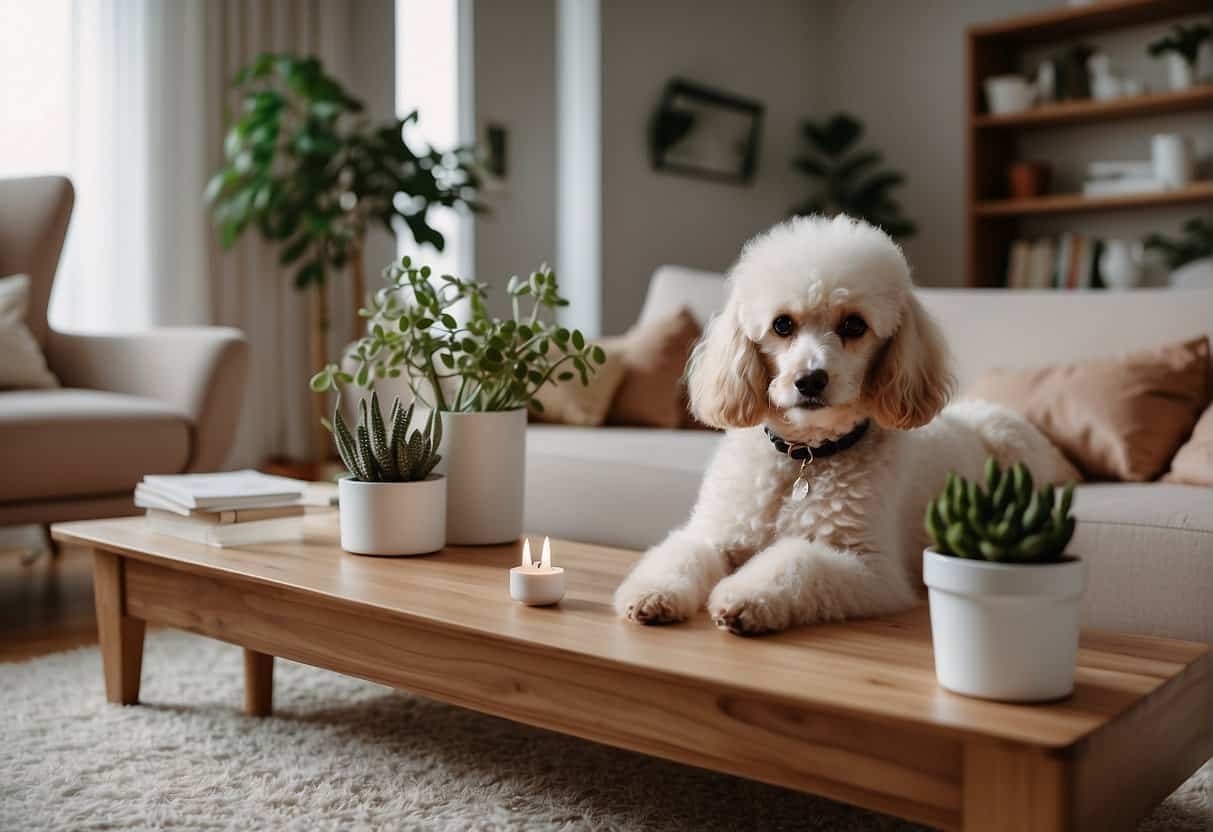
When owning a Poodle, you know they need a proper diet, exercise routine, training, and daily to stay healthy. Many Poodle owners seem to overlook their dog’s sleep habits.
How many hours a day should a Poodle sleep? Also, does it matter when and where your dog sleeps?
We answer your burning questions on the Poodle’s sleep cycles!
About This Guide
- Real Experience: Written by poodle enthusiasts with years of hands-on experience caring for and training poodles.
- Expert Reviewed: Content verified by certified dog trainers and veterinary professionals.
- Fact-Checked: Information sourced from the AKC, veterinary journals, and breed specialists.
- Last Updated: November 2025
How Much Sleep Should Poodles Get?
The answer is not as simple as you might think. As we will cover, there are many factors that go into determining the amount of sleep your pooch needs. One thing to consider is what type of environment your dog lives in. If your dog lives in a home with other pets or children, he may need more sleep than if he lived alone.
Another factor is whether your dog has any health issues. Some breeds tend to have certain health problems such as hip dysplasia, which can cause pain during sleeping. Other conditions like allergies or skin disorders could also affect your dog’s ability to sleep comfortably.
Newborns
The newborn phase is a temporary stage of life and filled with quality sleep!
Your newborn Poodle will sleep anytime he isn’t nursing. These Poodles will nurse every two hours, but even then, their eyes remain shut, as if they’re eating while sleeping.
As your newborn Poodle continues growing, he’ll slowly begin spending more time awake. Once your newborn Poodle reaches three weeks old, he will have 2-4 hours of daily active time. These are broken up in small spurts of energy, exploring their surroundings.
Poodle Puppy
Poodle puppies quickly grow and change. These young Poodles require a lot of restful sleep to recharge and fuel their growing bodies.
When Poodles are 2-5 months old, they get 18-20 hours of sleep per day, including daytime naps and a full sleep at night.
Puppies would sleep in longer stretches come night, though they’ll have to wake up to stretch and relieve their small bladders. Sometimes, puppies wake up in the middle of the night with a sudden burst of energy, wanting to play. It’s a bit tough dealing with energetic puppies in the middle of the night, but they’ll learn to sleep throughout the night once they hit four months old or sooner.
Puppies from 6 to 12 months old sleep for 14-16 hours per day. At this stage, older poodle puppies are more curious and have a higher activity level. These puppies will sleep through the night for about 6-9 hour stretches.
Puppies will also take naps throughout the day. They also have times when they rest and lie down sleeping, but they are still somewhat alert. Expect to witness the puppies’ high energy when awake, when they want to play all day long!
Adult Poodles
Adult Poodles usually have 12-16 hours of sleep a day. That number increases as your Poodle ages.
Studies show that middle-aged and older dogs tend to sleep more during the day than young adults do . That’s because older dogs take more naps, not because they have longer ones. Older adult dogs would run out of energy and require more rest than younger ones.
Older and middle-aged Poodles sleep more at night than their younger counterparts, as they have much longer stretches of sleep per night, waking up fewer times.
That said, the amounts of sleep a Poodle gets will vary, depending on his personality, temperament, and living conditions. But adult Poodles would sleep an average of 12-16 hours per day.
Senior Poodles – Senior Dogs
We consider Standard Poodles as senior citizens once they reach seven years old. For the Toy Poodle, we consider them seniors when they are 8-9 years old.
By this time, you’ll notice your dog sleeping more and for longer periods of time. While their increased need for deep sleep won’t happen suddenly, you’ll see it gradually changing.
After all, dogs are like humans, and they will slow down and have less energy than when they were puppies.
Senior Poodles would sleep for 14-16 hours a day, and once they reach 10-14 years old, they can sleep up to 18 hours daily.
Besides that, your Poodle’s sleep patterns would change. It’s normal for Poodles to take more naps throughout the day, waking up a few times at night. These changes happen gradually, and unless it occurs suddenly, it’s nothing to worry about and a typical occurrence.
Consult the vet right away if you notice sudden changes in a senior dog’s sleep quality and daily routine. It can mean serious medical issues like arthritis, dementia, hypothyroidism, or other age-related health conditions.
Older Poodles tend to wake up more at night because their bladders are getting older, thus increasing the need to potty. You can help your Poodle get a restful sleep by limiting his water intake and taking him out to relieve himself before it’s time for bed.
Common Poodle Sleeping Problems and Solutions
What if your poodle doesn’t sleep as much as the average dog does? Many pet owners have trouble getting their Poodles to settle down and sleep, too, so you aren’t alone.
Your Poodle may experience various sleep problems, such as:
- Crying and whining at night
- Struggling to settle down
- Waking up in the middle of the night or too early in the morning.
You might even notice your Poodle sleeping well consistently, only to have issues again after a few weeks. That’s sleep regression, which you can expect.
Or, if your puppy has sleeping issues, he’s most likely going through growth spurts or teething, causing sleep difficulties.
You and your Poodle don’t have to keep suffering from sleep disorders and sleepless nights, losing rest! Here are helpful tips to follow so you can improve your Poodle’s sleep habits:
Follow a consistent sleep schedule.
Dogs live off routines and benefit from them most. When your pet knows what to expect and has cues to signify it’s time for bed, it will have an easier time settling down for quality sleep.
Keep bedtime at a consistent schedule and include a peaceful routine. Your routine can start by using the restroom, dimming the lights, lessening the noise, and creating a calm and relaxing environment.
When you and your Poodle go to bed at the same time every night, you’ll both have an easier time going to bed.
Allot exercise time for your Poodle
Poodles are active breeds with a high intelligence and energy level, thus needing daily exercise. This dog breed requires a lot of stimulation to prevent boredom, frustration, and all the energy that prevents sleep!
Giving your Poodle regular exercise in the morning and two hours before bedtime. Include high cardio exercises and engaging activities for a physically and mentally tired Poodle ready to tucker out.
Prepare a specific sleeping area for your Poodle.
Like humans, a dog won’t feel 100% comfortable sleeping in an area he isn’t familiar with, especially when alone. That’s why it’s essential to set a specific sleeping area for your Poodle to create a routine, letting your dog know it’s time to sleep.
The specific sleeping area can be next to the bed. Or, it can be a crate outside the bedroom or on your bed!
Make sure that your Poodle’s sleeping area is cozy and sleep-inducing. Invest in a soft dog bed and include your dog’s favorite stuffed toy, which helps him feel safer and secure. Puppies feel comfier and sleep better with stuffed animals that smell like you!
Change meal times or limit water intake.
Poodles would wake up in the middle of the night because they needed to relieve themselves. Prevent that from happening by taking their water bowl away after a specific time at night.
If your Poodle still has to go to the bathroom to break at ungodly hours, change his mealtime. You can make mealtimes a few hours earlier or later, so your dog can either relieve himself before bedtime or the next day.
Why does your Poodle wake up?
Does your poodle wake up very early in the morning? Find out why.
Your Poodle might wake up very early because of the sun shining, the loud noises, or because you do!
Try using blackout curtains and a white noise machine to block off the sun and external noises. Not only does it help your Poodle rest well, but you’ll notice better sleep on your end, too!
If you just brought home a Poodle puppy, crying and whining at night is normal, especially during the first few days. Remember, it takes a dog some time to get used to his entirely new home.
The same will go for older Poodles you just adopted or if you recently moved to a new house with your dog. When your dog experiences a whole recent change, make sure you have familiar items and keep his sleeping area as comfortable as possible so he can rest easier in the new place.
Monitor your Poodle’s sleep
Whether your Poodle has sleeping disorders, tracking your dog’s sleeping and eating patterns in a journal could be beneficial. That way, you can watch out for any problems and monitor your dog’s health progress, especially if he has a health condition.
A journal will also make tracking any sudden changes in your Poodle’s eating or sleeping patterns easier. If you sense anything suspicious or out of the ordinary, take your Poodle to the vet immediately.
Can your Poodle sleep with you?
It’s possible to sleep beside your Poodle. You even get to reap many benefits, such as:
- Ease stress and anxiety
- Mote warmth
- Better security
- Lots of love and cuddles that release oxytocin
- Decrease loneliness
- Strengthen the bond with your Poodle
However, take note that sleeping with your Poodle can increase the possibility of separation anxiety and affect your sleep quality.
That said, you can also try crate training if you’re not comfortable sleeping beside your dog. Crate training also teaches your Poodle to behave throughout the day, especially if you need to leave for long periods at a time.



